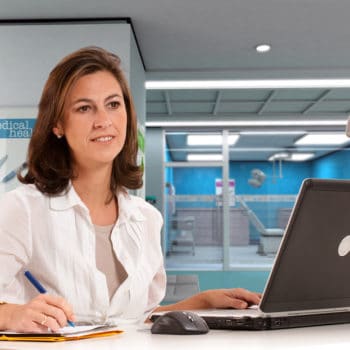Why We Love It
-
$36,920Potential Avg. Salary*
-
Growing DemandJob Outlook
* Salary & growth data is based on the recent Bureau of Labor and Statistics data published at https://www.bls.gov/oes/current/oes319099.htm for 31-9099 Healthcare support workers, all other 11/2021. Based on national data, not school-specific information. Conditions in your area may vary.
A bachelor of science in audiology or speech-language pathology provides a starting point for aspiring audiologists and speech-language pathologists.
While a graduate degree is needed to work as a doctor in the field, a bachelor’s degree in audiology or speech-language pathology provides the education needed to jump-start your career and gain valuable experience by finding work as an assistant to an audiologist or speech-language pathologist.
What is a Degree in Audiology/Speech-Language Pathology?
Students who major in audiology or speech-language pathology study the science of hearing and verbal communication. They take courses in anatomy, physiology, psychology, and communications in order to learn the different causes and potential cures for hearing and speech impediments.
This education prepares them for a career working with the deaf or hearing impaired, working with seniors, children with communication disorders, or individuals with speech impediments.
With a bachelor’s degree, graduates can find work as assistants to audiologists or speech-language pathologists—depending on their interests. This allows students to earn an income and gain valuable experience while pursuing the graduate degree required to work as a medical professional.
With a master’s degree, students can find work as audiologists in ear, nose, and throat (ENT) offices, or as speech-language pathologists in clinics and elementary, middle, and high schools across the country.
Recommended Schools
What Courses Would I Take For a Major in Audiology/Speech-Language Pathology?
- Normal Language Acquisition
- Phonetics
- Audiology
- Hearing Science
- Language Disorders in Children
- Speech Science
- Rehabilitative Audiology
- Phonemic Disorders
What Jobs Can You Get with a Degree in Audiology/Speech-Language Pathology?
As individuals age, hearing issues become more common, and an increased likelihood of stroke increases the chances for seniors to develop communication problems.
With the Baby Boomers—one of the largest generations of our time—nearing retirement age, it’s expected that experienced audiologists, speech-language pathologists, and assistants to these professionals will be in high demand. Graduates should be able to find work in the field with either a bachelor’s or master’s degree.
How Long does it take?
A bachelors in Audiology/Speech-Language Pathology will have a typical length of 4 years in a full time schedule. That said, there are many ways to speed up the timeframe by either taking more units via online coursework, community college, or taking free classes at OnlineDegree.com that could transfer to universities in the US.
Online Audiology/Speech-Language Pathology Degree
Audiology speech-language pathology is not popular as a bachelor’s degree program, but it is more commonly available as a master’s degree. Students are usually required to complete around 120 credit hours to earn a bachelor’s degree in communication sciences and disorders with a specialization in audiology speech-language pathology.
Most programs would also require clinical practicum in a recognized institute. You should carefully consider the accreditation of the program as it can significantly affect your career.
What Can You Do With an Audiology/Speech-Language Pathology Degree?
Speech-language audiology and pathology is a field of study that is concerned with speech difficulties that are caused by certain diseases. It deals for example with children who were late in speaking compared to their peers. This can be caused by several diseases as autism, cerebral palsy, or hearing difficulties.
Audiologists and pathologists can also work with elders who lose the ability to speak due to a neurodegenerative disease or trauma. Speech pathologies are not limited to total loss of speech but also include articulation disorder, apraxia of speech or stuttering.
Graduates of audiology speech-language pathology have comprehensive knowledge in the field making them more qualified to handle these disorders compared to other healthcare professionals.
What does an audiology speech-language pathology student learn?
Audiology speech-language pathologists learn about the development of speech during childhood and how it can be affected by the language spoken and its complexity. They also learn about how things may get wrong and how problems related to hearing or speech may arise. The following list shows courses that are commonly offered in audiology speech-language pathology degree programs:
- Anatomy and physiology of speech and hearing: this course introduces the anatomical structures of the organs and tissues involved in hearing and speech and how these organs normally function.
- Phonetics: it is a branch of linguistics that focuses on how humans produce and perceive sounds.
- Audiometric testing: it is a branch of the science that deals with the methods available for measuring the hearing acuity for variations in sound intensity and pitch and for tonal purity. It is a critical science for early diagnosis and treatment of hearing problems in infants. Treatment of hearing problems before a certain age is essential for normal development of speech.
- Aural rehabilitation: it refers to the diagnosis of hearing loss which is important to provide corresponding treatments or hearing aids.
- Clinical phonology: This course introduces the explanation and treatment of speech disorders.
- Language disorders across the life span: this course shows that speech disorders can occur during various stages of life with more focus on speech disorders in adults.
Now I have the audiology speech-language pathology degree…where can I work after graduating?
Statistics show that more than 11% of children suffer from language or speech disorders that limit their ability to communicate with other people. Communication difficulties may also result in learning problems. Accordingly, audiologists and pathologists are critically needed during this period.
The following are the most common career options available for audiology speech-language pathology graduates:
- Speech-language pathologists: they provide comprehensive services starting from assessment and diagnosis then providing adequate treatment plans. They may need to communicate with families or teachers to provide the needed support to affected children.
- Audiologists: they specialize in working with patients having hearing problems. Their work usually includes selecting and fixing hearing aids.
- Speech-language educator: the role of this job is to educate families, teachers and the public about communication disorders including diagnosis and treatment of these disorders.
- Private practitioner: you may choose to run your own clinic which also depends on the state and federal laws and regulations governing this field of work.
- Speech therapist: the role of the therapist is to train children to strengthen and coordinate their muscles used to pronounce words and sounds.
Should I choose an audiology speech-language pathology degree?
This field of specialization is a good choice for people who are passionate about providing support to children. It is a self-rewarding career as you can see the positive results of your work on the children’s lives.
You should consider the following skills if you intend to gain success in this career:
- Patience: achieving significant results with children with speech difficulties requires a long time that extends for months or even years. They usually seem completely irresponsible in the beginning, but they start to change slowly with time and persistence.
- Listening skills and attention to detail: you should listen carefully to the children to determine the problems related to speech.
- Ability to cooperate: audiologists and pathologists work closely with teachers and families to provide the required support to the children.
- Other skills: compassion, integrity, motivational skills, quick response time, excellent vocal and language skills, and research skills.
Recommended Schools
Best Jobs for Audiology/Speech-Language Pathology Degrees
With a bachelor’s degree, you’ll be able to find work as a medical assistant for audiologists and speech-language pathologists. You’ll work with patients, helping measure them for hearing aids, recording treatments for records and doctor review, and conducting tests to evaluate the extent of hearing damage or speech disorder.
If you choose to continue your education and earn a master’s degree, you can find work as a medical professional as an audiologist or speech-language pathologist.
How to save time and money
Our mission is to help you to avoid paying full price for college. We want your Audiology/Speech-Language Pathology degree to be affordable and accessible. Here’s how you could save:
Create Your Free SmartPlan

There are many ways to make college affordable and accessible.
That’s why we created a helpful tool called SmartPlan.
It’s free, and helps you find potential ways to save and tons of information about each school you’re considering
Think of it as your “college blueprint”, to help you instantly craft a path to your degree:
- Which Colleges Match Your Needs
- Ways You Could Save Time & Money
- Free Courses You Could Take for Credit
- Valuable Data and Insights on Each College
- Detailed Steps You Should Take!
See what’s possible for you and generate a free plan within just a few minutes
Create My SmartPlanYou Might also be Interested in
Many visitors who look for a degree in Audiology/Speech-Language Pathology are also interested in the following degrees.













